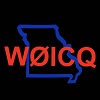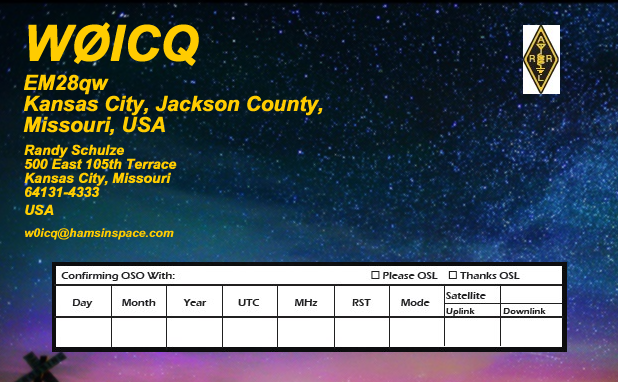| |
HF Radio fascinates me! It always
has... The thrill of being able to
have all the right conditions to come together at once to allow
you to speak in real time, to someone on the other side of the planet
has always brought excitement to me!

Since
the Fall of 2013, I've been running a Kenwood TS-2000 under a Comet
CHA-250B Vertical Antenna, and from time to time will put up wire
dipoles and play with them. (See
the link to Shack Antennas.) I still own a Yaesu FT-897D, but
I intend to use it mainly for field use. I’ll admit that I
may not be running a contest grade station, but I do get credible
results. The spot map below, and the log of my recent contact speaks
for itself.

To see what I've done with my Yeasu FT-897D, go to: http://hamsinspace.com/Gator/index.htm.
Then, go to: http://hamsinspace.com/resource/CQ_Magazine-Vol_74_No_10_Oct_2018.pdf
to see the article in CQ Magazine about this very same Yaesu FT-897D
mounted in the Gator Case.
I’m
not an expert on working HF, but if there was any advice I might
give to someone starting to work these bands, is hang in there,
keep trying, and above all listen, listen, listen.
And most important...
Have Fun!
Update:
May 12, 2023
I
am now W0ICQ!
Well,
after 14 years I finally did it. I changed my call sign. Effective
May 12, 2023 I am W0ICQ.
Why
after all these years did I change my call sign? When working
HF pile ups and calling out with KD0HKD, I would typically get
a reply like, “KD Zero something?" I’d
reply with my call sign. The other end would come back with, “I
got your prefix, what is your suffix?” I’d reply
with my call sign, slowly and phonetically with something like,
“Kilo-Delta-Zero-Hotel-Kilowatt-Delta.” Without
fail, the other end would comeback with, “KD-Zero station,
I got your prefix, I need your suffix, your SUFFIX!”
I’ve had a few drop me all together so I wouldn’t
get the contact credit. After some long thought, I came to the
conclusion that it was more than time for a change!
Now
be aware; if you’ve had your old call sign for awhile, there’s
going to be a lot of things more than just the FCC that will need
to be changed. ARRL, LOTW, Ham Radio Deluxe and how it interfaces
with LOTW, QRZ, EchoLink, any websites you might have, and if
you’re like many of us, ultimately your State’s Department
of Motor Vehicles, to name a few. While I’m handling all
of that, you might keep that in mind before making the switch.
Update:
July 18, 2014
National
World War I Museum
My
radio club, the Raytown Amateur Radio Club, K0GQ
teamed up with the Radio Club of the National World War I Museum,
WW1USA to host a Special Event
Station and ARRL Field Day on their grounds. This video, produced
by JD Dupuy, highlights the Raytown Amateur Radio Club at the
National World War I Museum at Liberty Memorial in Kansas City
on June 28/29, 2014. My hat is off to JD for producing such outstanding
videos!
Update:
March 24, 2013
My
Favorite QSOs!
Every
Ham has a few favorite or memorable contacts that stand out in
their memory. Everyone always remembers their first contact, or
their first DX contact.
My
first licensed contact was with my friend Jeremy Widner, who at
the time had the call sign of KD0HJV with our 2m HTs via the Raytown
Repeater. Jeremy is AC0DX today. My first DX contact outside of
North America was with Kentaro “Ken” Suzuki - JO7CVU
from Sendai in Japan on 15 meter. Ken’s radio shack was
destroyed in the great tsunami disaster in 2010, but we have traded
e-mails since then.
One
of my favorite contacts was via satellite while I was traveling.
I was near Portland, Oregon on July 6, 2010, where I arranged
to make contact with my friend Eddy Paul, KD0HZW near Kansas City.
(He is KY0F today.) Our contact was made via satellite on AO-51,
and is detailed on my web site at https://kd0hkd.com/KD0HKD/satellite/Oregon.htm
. You can also hear recordings of the QSO from that web site as
well!
Back on May 22, 2011, I was at home, simply tuning around the
bands, and not having much success. I dropped over to 6m and was
not having much luck their either when I heard a voice calling
CQ on 50.135 KHz. It turned out to be Bob Kimbrell – W0AO
who was operating a back pack radio at Dayton, Ohio. Bob is from
here in Kansas City, and is one of my friends at the Raytown Amateur
Radio Club. By pure coincidence, Bob and I ran into each other
on 6m while he was in Ohio!
Late in the evening during June of 2012, I was again at the home
shack, spinning the dial, and not finding much on the air. This
noise level was very low, but not much activity. On 15 meters,
I heard a faint voice calling CQ to which I replied. There was
a pause when the voice came back saying, “Wow! I turned
on the radio to call for a few of my local mates, and I found
a Yank! How’s it going?” The station was Ken Osborn
– ZL3OZ in New Zealand! We were both surprised! Ken sent
me a very nice, hand drawn QSL card.
You simply don’t know who or where you’re going
to run into someone interesting on the ham radio bands!


Update: November 10, 2012
I
passed the exam to earn my Amateur Extra License!
Was it easy? No. Was it difficult? I don’t know if difficult
is the right word. I believe the correct way to describe it would
be to say it was a challenge.
In the past, with my Technician and General License Tests, my
approach had been different. For Technician, with my previous
experience with electronics and broadcasting, I simply reviewed
the Gordon West Study Guide, took the test, and passed. For my
General, I actually studied the Gordon West Study Guide and drilled
myself with the practice tests on QRZ.com until I was confident
I could pass. For my Extra, I knew this would be more in depth
and a challenge.
I used a several pronged approach to my preparation for the Extra
exam. Naturally, I picked up the Gordon West Study Guide for the
Extra Test. I always appreciated that he not only provided you
with the examples of the questions, and the choice of answers,
he also provided you with the reason why the answer was correct.
Next, one of the members of the Raytown Amateur Radio Club, of
which I am a member offered to lead study sessions for anyone
interested in preparing for the Extra Exam. I’ve always
done well when taught a subject by a human, so I certainly took
advantage of this generous opportunity. (Thanks Robin!)
Finally, on the advice of a friend, I subscribed to Ham Test On-Line
(http://www.hamradiolicenseexam.com)
This is a subscription service which costs about $35.00. They
describe their process as “The Software That Knows You!”
I found this slogan to be true. Upon logging in, and clicking
the button to study, you are presented with a page describing
a theory you would need to learn. Not a real in-depth explanation,
but a concise overview. Within the overview are links that can
take you to other site that can provide more depth and detail
if you want or need it.
Upon clicking next, it hits you right away with a question from
the exam. Here’s where the software gets to “know
you.” Like most on-line practice tests, this one will
not let you move on until the correct response is received, but
it remembers if you missed this question, and it will keep coming
up again and again until you answer that question consistently
correct. As you continue along, it will introduce new topics and
overviews to teach you about the various things you should know,
and it will continue to provide you with questions from previous
topics to answer as a review, and will continue to hammer
you on questions or areas that you’ve been showing difficulty
until you’re getting it right.
For me, this was not simply drilling me, as in the case of other
practice tests, it was actually teaching me the science and information
I should know, while forcing me to pay attention to areas where
I might be showing weakness.
While about one third of the way through my studies, on a whim
I decided to take the exam for real while attending a
local hamfest. I must admit that I failed, but I did not fail
miserably! I had only worked one third of the way through the
study material, and managed to fail by only two or three questions.
I was not thrilled, but I was not disappointed either. I chalked
this up to a good learning experience and got back to work!
Two weeks later, I was READY! I had reviewed my work
via each of my three approaches, and even threw a few QRZ practice
tests in for good measure. By this time, I was consistently passing
my drills in the 95% bracket. I took the test for real at the
next hamfest, and PASSED!
Everyone learns differently. The learning strategy I used worked
for me, but it may not work for you.
In any case, for whatever class of license you are preparing for,
I would certainly recommend Gordon West’s Study Guides.
I would also highly recommend the investment in Ham Test On-Line.
It was not that expensive, and it certainly helped me learn what
I needed to know.


|
|











